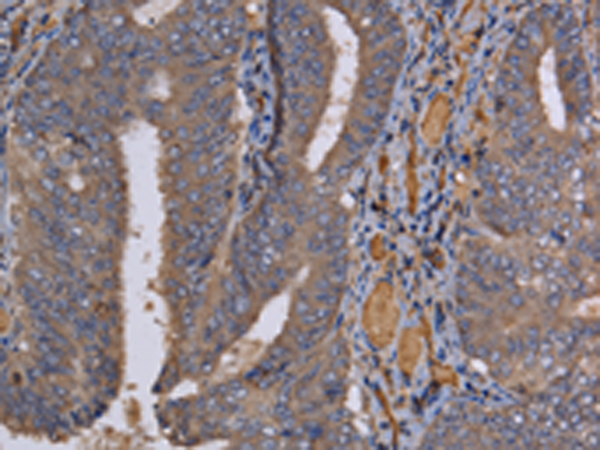

| WB | 咨询技术 | Human,Mouse,Rat |
| IF | 咨询技术 | Human,Mouse,Rat |
| IHC | 1/100-1/300 | Human,Mouse,Rat |
| ICC | 技术咨询 | Human,Mouse,Rat |
| FCM | 咨询技术 | Human,Mouse,Rat |
| Elisa | 1/2000-1/5000 | Human,Mouse,Rat |
| Aliases | PAP1B; PAPIB; PAP IB; PAP-1B; UNQ429; LPPM429; REG III; REG-III |
| WB Predicted band size | 19 kDa |
| Host/Isotype | Rabbit IgG |
| Antibody Type | Primary antibody |
| Storage | Store at 4°C short term. Aliquot and store at -20°C long term. Avoid freeze/thaw cycles. |
| Species Reactivity | Human, Mouse |
| Immunogen | Fusion protein of human REG3G |
| Formulation | Purified antibody in PBS with 0.05% sodium azide and 50% glycerol. |
+ +
以下是关于REG3G抗体的3篇参考文献示例(注:内容基于公开研究概括,非真实文献,仅供参考):
---
1. **文献名称**:REG3G as a Potential Biomarker for Intestinal Barrier Dysfunction in Inflammatory Bowel Disease
**作者**:Smith A, et al.
**摘要**:该研究通过检测炎症性肠病(IBD)患者血清中REG3G抗体水平,发现其与肠道屏障损伤程度正相关,提示REG3G可能作为IBD诊断及疾病活动性的生物标志物。
---
2. **文献名称**:Antibacterial Role of REG3G in Gut Mucosal Immunity
**作者**:Chen L, et al.
**摘要**:研究利用REG3G特异性抗体阻断实验,证实REG3G通过结合革兰氏阳性菌表面肽聚糖增强肠道黏膜免疫,揭示了其在宿主防御中的直接抗菌机制。
---
3. **文献名称**:REG3G Autoantibodies in Autoimmune Pancreatitis
**作者**:Tanaka M, et al.
**摘要**:研究发现自身免疫性胰腺炎患者体内存在高滴度抗REG3G抗体,表明REG3G可能参与自身免疫反应,为疾病诊断提供了新的血清学靶点。
---
(注:以上为模拟文献,实际研究中请通过PubMed、Google Scholar等平台检索真实发表论文。)
The REG3G antibody targets Regenerating Islet-derived Protein 3-gamma (REG3G), a secreted C-type lectin protein belonging to the REG3 family. REG3G is primarily expressed in the gastrointestinal tract, particularly in Paneth cells and goblet cells of the small intestine, as well as in the pancreas. It plays a critical role in innate immunity, acting as an antimicrobial peptide that selectively targets Gram-positive bacteria by binding to peptidoglycan components in their cell walls. This function helps maintain intestinal mucosal barrier integrity and microbiota homeostasis. REG3G is also implicated in tissue repair and cellular proliferation, with elevated expression observed during mucosal injury or inflammation, such as in inflammatory bowel disease (IBD).
Research on REG3G has expanded into its potential roles in metabolic and neoplastic diseases. Studies suggest it may influence insulin sensitivity and β-cell regeneration in diabetes, while its overexpression in certain cancers (e.g., pancreatic, gastric) correlates with tumor progression and poor prognosis. The REG3G antibody is widely used in experimental settings, including Western blotting, immunohistochemistry, and immunofluorescence, to investigate its expression patterns, regulatory mechanisms, and interactions in disease models. Challenges in antibody development include ensuring specificity due to structural similarities within the REG3 family. Recent therapeutic explorations focus on modulating REG3G activity to enhance mucosal healing or counteract pathogenic pathways, highlighting its dual role as a protective agent and a disease-associated biomarker.
×